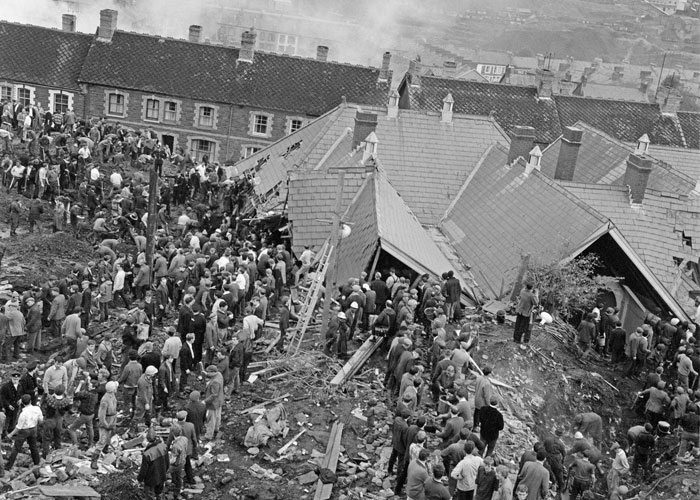As we remember Aberfan today, why don’t we learn the lessons?

A personal view: News from Wales Editor Lisa Baker reflects on the lessons of Aberfan disaster.
Every year another anniversary passes, pictures of the horrific Aberfan disaster are shared on social media and the Welsh rightfully mourn our dead. I hope their memory reminds us to avoid complacency and heed warnings, too.
So many people in South Wales lost someone on 21 October 1966, as a mining tip sited above a natural spring subsided. The tip slid full-force down the mountain into the local school, with the loss of 144 lives, most of them young children.
Tears are still shed for the lost children and their teachers. Though many of them have now also passed, the horrific memories of Aberfan would haunt the first responders who came to the aid of the survivors for the rest of their lives. They heartbreakingly dug out the dead as respectfully as they could.
I hope, along with the tears, tweets and hashtags today, the lessons are remembered.
Killed by complacency
Disasters happen. Flooding, volcanoes, earthquakes cause huge loss of life and it is always sad. However, Aberfan shouldn’t be really described as a ‘disaster’ in my view.
Aberfan was an entirely predictable consequence of an enterprise that continued despite being made aware of the risk – not just my view, but the findings of a tribunal who blamed the event on a “bungling ineptitude by many men” that had failed to heed clear warnings about the mining tip, perched precariously on the side of Mynydd Merthyr.
Warnings came in 1964 from local councillor Gwyneth Williams, who had warned that if there were a landslip it would threaten the school and the children within it. Just two years before the disaster two mothers had given a petition to the school, with concerns over flooding, and also passed it to the local council. Waterworks engineer DCW Jones also sent a letter to a colleague and the National Coal Board in 1963, expressing concern about the tip. Even the headmaster, who also perished in the disaster, had issued warnings about the dangers of the tip. The National Coal Board took no action.
These worst predictions were realised and everyone agreed who was responsible, even the tribunal. But who learned and who paid the price, other than the victims? Incredibly, not one manager, employee or the corporation itself was sanctioned over Aberfan. Nobody then or since has been penalised for the loss of 144 lives. Even the chair of the NCB, remained in post and was even subsequently appointed to chair a committee that made recommendations to the Government about health and safety legislation.
A village betrayed
Anyone that thinks the villagers were properly supported would be shocked on doing some research – Wales Online did just that in 2016. The charitable Disaster Fund, set up to support the families, was ordered to pay the costs of removing the remaining Aberfan tips in 1968 – not the negligent coal board. Remember that when you share the #Aberfan hashtag today, because these families deserve the truth to be remembered alongside their loss.
Professor Iain McClean, who raised funds for the villagers, went on to do extensive research into why Aberfan went unpunished. McClean concluded:
“The NCB and its senior officers escaped scot-free because the governments of the late 1960s and early 1970s needed their help in the ‘high politics’ of running down the coal industry without provoking a national strike. There was no concept of ‘making the polluter pay’ in British public administration at the time, and a nationalised industry was treated as if it were a government department. Therefore, policymakers thought that it would be futile to make the NCB pay the environmental (or even the direct) costs of the disaster, as such a payment would merely increase its deficit, which fell to be funded out of general taxation in any case.”
It is hard to fathom how betrayed the villagers were and how they must feel about it. My friend’s Dad, one of the first responders, took the memories of that night to his grave, and tearfully told his son how he’d thought of that night every day since. He didn’t tweet once.
Health and Safety – how many workers and bystanders die today
It’s easier for modern business owners, managers, leaders and politicians to tweet and hashtag their support than to prevent other manmade ‘disasters’. Only a few months ago, two men left their homes close to where I live to work on the railways. They didn’t come home, after being struck by a train in front of a colleague, a sight that nobody should have to witness. A recent inquest found the lack of a safe system of work has been blamed for their deaths. Let’s write that how it is, their employer had not bothered to make sure their staff would be safe at work. Two lovely men lost their lives and two families have been left devastated as a result, leaving the local community in shock.
Sadly, they are not alone. 147 Workers were killed in workplace accidents in the year 2018/19, and 92 members of the public also died. It’s easier to think that ‘it probably won’t happen’ than to invest in the certainly of preventative measures. Whoever is responsible, complacency is never good enough, because sooner or later, the inevitable, predictable, almost always happens.
Climate change complacency
If Aberfan does not already strike a chord on the need to stamp out complacency, it should – but we are facing an even greater risk today that so far is being ignored.
A 2017 report in the journal Nature predicted that by 2100, 75% of people around the world would be exposed to heatwaves extreme enough to kill. However, we don’t have to wait – deaths due to climate change are already occurring.
Scientists are delivering overwhelming evidence of a planet in crisis. Even if Governments are not listening, everyday people are. While the Extinction Rebellion marches have the loudest voice in the Capital, across the world, everyday people are giving up their weekends to call for change. These scientists are the Williams and Jones of our day. What will it take for us to listen? Like the NCB in the early sixties, we are ignoring the warnings and hoping it won’t happen.
For those who think we are taking action, think for a second. Everyone needs to play their part, but while everyday people strive to recycle, replace inefficient lighting and landlords work on their properties, the big polluters are able to claim compliance by buying ‘carbon credits‘. In other words, donating to a charity that tells the rest of us what to do, effectively gives them permission to pollute the planet. Fixing the issue is simply inconvenient and upping the price won’t solve the problem.
By all means remember Aberfan today, the children, the teachers, the rescuers, the bereaved families – they deserve that. However, take a minute to ponder too, the cost of complacency and the shocking way these families were treated by a system that failed to value them – and resolve to do better. If we don’t remember that, and apply the lessons, we learned nothing.
I will remember the 144.





